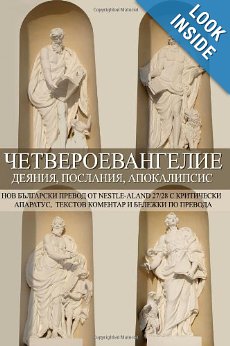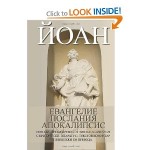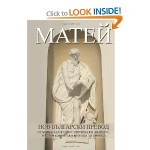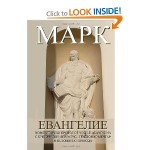Tetraevangelion: New Bulgarian Translation
Comments Off on Tetraevangelion: New Bulgarian Translation
![51slqju0EsL._SY344_PJlook-inside-v2,TopRight,1,0_SH20_BO1,204,203,200_[1]](https://cupandcross.com/wp-content/uploads/2013/12/51slqju0EsL._SY344_PJlook-inside-v2TopRight10_SH20_BO1204203200_1.jpg) Tetraevangelion: New Bulgarian Translation: Matthew, Mark, Luke, Acts, John, Epistles, Apocalypse (New Bulgarian Translation of the Bible) (Bulgarian Edition)
Tetraevangelion: New Bulgarian Translation: Matthew, Mark, Luke, Acts, John, Epistles, Apocalypse (New Bulgarian Translation of the Bible) (Bulgarian Edition)
New Bulgarian Translation (NBT) 2007-2013
MATTHEW: New Bulgarian Translation (NBT), 2009
MARK: MATTHEW: New Bulgarian Translation (NBT), 2011
JOHN: Gospel, Epistles, Apocalypse New Bulgarian Translation (NBT), 2007
LUKE: Gospel, Acts New Bulgarian Translation (NBT), 2013
The Four Gospels of the New Bulgarian Translation Published
August 15, 2013 by Cup&Cross
Filed under Featured, News, Publication, Research
We are both happy and humbled to announce the publication of the Tetraevangelion of of the New Bulgarian Translation including:
- Matthew (2011)
- Mark (2010)
- Luke: Gospel and Acts (2013)
- John: Gospel, Epistles and Apocalypse (2007)
This final volume has been almost ten years in the making as it combines all four previously published volumes. It is new literal translation in the Bulgarian vernacular directly from the Nestle Aland Novum Testamentum (27/28 editions).
We thank friends and foes for the internal motivation without which this work would have never been completed.
We are currently working on another similar project, namely the publication of a Study New Testament in Bulgarian, which will be ready for print by the end of this summer.
Luke and Acts Published (New Bulgarian Translation)
We are both happy and humbled to announce the publication of the Luke/Acts volume of the New Testament in Bulgarian. This fourth and final volume of our literal translation was presented to the churches on the day of Pentecost, which this year in Bulgaria was on June 25th. It has taken us almost seven years to complete the translation work as we published: John: Gospel, Epistles and Apocalypse (2007), Mark (2010), Matthew (2011) and finally the Luke: Gospel and Acts (2013). We thank friends and foes for the internal motivation without which this work would have never been completed. We are now working on the publication of a Study New Testament in Bulgarian, which will be ready for print by the end of this summer.
Newly Revised Bible Released for the Bulgarian Easter
 The Revised Version of the 1940 Bulgarian Bible, which our ministry has been working on since 2005 and released earlier in 2012, was presented at various book markets, festivals and churches for the Bulgarian Easter on May 5th.
The Revised Version of the 1940 Bulgarian Bible, which our ministry has been working on since 2005 and released earlier in 2012, was presented at various book markets, festivals and churches for the Bulgarian Easter on May 5th.
The 1940 revision was initiated in 1920-24 by the British and Foreign Bible Society, reprinted multiple times and smuggled in Bulgaria under communism. It is perhaps the most read Bulgarian Bible of all times. While a number of new versions have attempted to replace it, this revision made by our team in the past seven years while ministering in Bulgaria has preserved the original text in its entirety and made it available to Bulgarian readers abroad.
Bulgarian Bibles to be released by our team in the summer of 2013:
- May 24, 2013: Bulgarian Culture Holiday: A New Study New Testament with commentary, charts, maps and explanatory annotation
- June 23, 2013: Pentecost in Bulgaria: Luke: A New Bulgarian Translation – the final of four volume new translation series which we began in 2007
Bulgarian Bible Revisions and Translations released by our ministry so far:
- 1871 Constantinople Bible (in its final Vienna Revision of 1914)
- John: A New Bulgarian Translation (2008)
- Matthew: A New Bulgarian Translation (2010)
- Mark: A New Bulgarian Translation (2011)
New Bulgarian Translation of the Bible Released
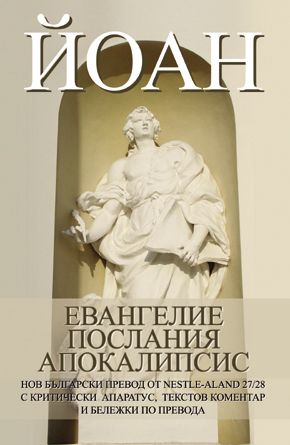 Cup & Cross Ministries has released a new translation of the complete Johannine works (the Gospel, Epistles and Revelation) for the Bulgarian Easter on April 27, 2008.The final result of this project is a 90-page book including Bulgarian literal translation from the Greek originals NA 27/28, critical apparatus, textual commentary and translators notes. The book is successful in its purposes to provide a literal translation in the Bulgarian vernacular, exact preservation of the word order from the original text, translation of the Greek grammatical forms, as well as the Hebrew and Aramaic linguistic uniqueness of the text and a preservation of the original parts of speech and verb tenses. Read more
Cup & Cross Ministries has released a new translation of the complete Johannine works (the Gospel, Epistles and Revelation) for the Bulgarian Easter on April 27, 2008.The final result of this project is a 90-page book including Bulgarian literal translation from the Greek originals NA 27/28, critical apparatus, textual commentary and translators notes. The book is successful in its purposes to provide a literal translation in the Bulgarian vernacular, exact preservation of the word order from the original text, translation of the Greek grammatical forms, as well as the Hebrew and Aramaic linguistic uniqueness of the text and a preservation of the original parts of speech and verb tenses. Read more


